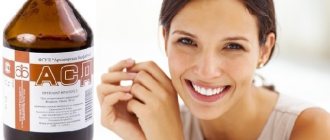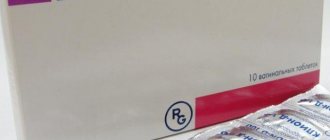Candidiasis is a very common fungal disease that affects the mucous membranes. The disease can affect not only women, but even children and men. However, most often, cases of vaginal candidiasis are recorded. Thanks to the modern pharmacological industry, a wide range of drugs have been developed that can be used in the treatment of thrush. These are various tablets, creams, vaginal ointments, gels, etc. They are prescribed for effective, rapid treatment of vaginal thrush. One of the most effective drugs is Klion D 100.
Using the drug Klion D for thrush
Candidiasis is a very common fungal disease that affects the mucous membranes. The disease can affect not only women, but even children and men. However, most often, cases of vaginal candidiasis are recorded. Thanks to the modern pharmacological industry, a wide range of drugs have been developed that can be used in the treatment of thrush. These are various tablets, creams, vaginal ointments, gels, etc. They are prescribed for effective, rapid treatment of vaginal thrush. One of the most effective drugs is Klion D 100.
Features of the use of Klion-D suppositories for the treatment of thrush
14.01.2018
Candidiasis is a common fungal disease among women of all ages. It can be triggered by many reasons. Modern pharmacology offers a wide range of drugs to treat this disease in the shortest possible time. Klion-D for thrush is considered one of the effective remedies.
Description of the drug and its effect
Suppositories for thrush Klion-D are a relatively new drug, which, due to its effectiveness, has already become popular. In addition to this dosage form, tablets for internal use and solutions for external use are also produced.
The composition of the medicine includes:
- active ingredients: miconazole – 100 mg, metronidazole – 100 mg;
- auxiliary: lactose, hypromellose, crospovidone, tartaric acid, sodium carboxymethyl starch, baking soda, magnesium stearate, sodium dodecyl sulfate, silicon oxide.
The effect of Klion-D 100 is determined by the active components of the drug:
- Miconazole has an antifungal effect - it is aimed at destroying and preventing the proliferation of fungi of the genus Candida, which is the basis for the treatment of thrush. Manifestations of candidiasis - itching, burning, discomfort and heavy discharge - disappear from the first use.
- Metronidazole is characterized by antiseptic properties, so it is advisable to use the drug for vaginitis and complicated infections.
By causing these effects, the drug does not disrupt the microflora of the genital organs, which is considered its advantage over its analogues.
Another advantage of Klion-D is that it does not accumulate or linger in the body. Metronidazole, absorbed into the systemic circulation, reaches its peak activity after 6 hours and is excreted through the excretory and digestive systems.
Dosage regimen
Klion-D for thrush is used strictly in the dosage prescribed by the doctor. According to the instructions, the course of treatment should last 10 days using 1 suppository per day.
The application algorithm is as follows:
- Hygienic procedures of the genital organs are carried out.
- The candle is prepared - taken out of the packaging and lightly moistened with boiled water at room temperature.
- The woman takes the “lying on her back” position, spreads her legs wide and inserts the suppository into the vagina as deeply as possible.
- In order for the drug to spread evenly in the area of inflammation and not leak out, it is recommended to maintain a horizontal position for half an hour.
Most often, the procedure is performed in the evening before bedtime, as it is more convenient. But the time of application of the product is not particularly important.
Contraindications
Klion-D can be used if the following contraindications are absent:
- period of the first trimester of pregnancy;
- lactation period;
- blood diseases;
- disorders of the endocrine system, in particular diabetes;
- liver disease in acute or chronic form;
- problems with coordination of movements;
- blood circulation problems in blood vessels;
- disorders of the nervous system, in particular epilepsy;
- children's age - up to 12 years;
- individual intolerance or hypersensitivity to the components of the drug Klion-D.
The use of suppositories should be agreed with the gynecologist, taking into account the medical history and current examination results.
Use during pregnancy and lactation
Against the background of hormonal changes and weakened immunity during lactation and pregnancy, thrush often occurs. Its treatment must be approached responsibly, especially in the second case, since drug substances can penetrate the placenta and affect the blood flow of the fetus. Most often, vaginal suppositories are used for treatment.
Klion-D can be used as prescribed by a doctor in the second and third trimesters and during breastfeeding, if there are serious indications for this . A woman should remember that the active substance metronidazole enters the blood and milk and remains there for at least another 8 hours, affecting the composition of fluids.
special instructions
Side effects when taking suppositories to treat thrush are rare if you follow the instructions and follow all the doctor’s instructions. But the list is quite lengthy:
- vaginal burning, itching and pain;
- increased thick, thick, cheesy discharge;
- dizziness and headaches, confusion, convulsions, irritability, hallucinations, bad mood;
- discomfort in the abdomen, nausea and vomiting, loss of appetite, metallic taste in the mouth, indigestion or constipation, which occur when drinking alcohol during therapy, so it should be completely avoided during this period;
- darker shade of urine;
- changes in the chemical composition of the blood towards a decrease or increase in the level of leukocytes;
- runny nose;
- allergies in the form of skin rashes accompanied by itching.
If such symptoms occur, you should stop using the drug and try other suppositories for candidiasis.
If adverse reactions occur, you should stop using the drug Klion-D and give preference to an alternative drug prescribed by your gynecologist.
It is recommended to abstain from sexual activity if you have thrush, and your sexual partner should be examined and, if necessary, take the necessary measures. If possible, you should avoid driving a car.
During menstruation, drug therapy is ineffective.
Interaction with other drugs
When using the drug, it is recommended to take into account possible reactions of its active component with other substances. It is not recommended to combine the use of Klion-D:
- with anticoagulants, since then there is a risk of increasing prothrombin time;
- disulfiram, used to treat alcohol dependence;
- antimicrobial drugs (strengthen the effect of miconazole, so there is a possibility of overdose).
The consumption of alcoholic beverages is strictly prohibited during the treatment of candidiasis with Klion-D.
The drug appeared recently, but has gained the trust of patients and is widely used for gynecological diseases, inflammatory processes of many organs, infections and fungal infections.
In addition to treatment, you can try folk remedies for thrush. Our separate article on the website talks about them in more detail.
Features of the use of Klion-D suppositories for the treatment of thrush Link to main publication
Source: https://TopGinekolog.ru/bolezni/molochnitsa/svechi-klion-d
General information
The cause of the development of thrush is the rapid growth of yeast-like fungi of the Candida type. It is worth noting that such fungi are found in the body of every woman, but in minimal quantities. They begin to develop under certain conditions. The main symptoms of vaginal candidiasis in women are:
- itching and burning of the genitals;
- redness, hyperemia;
- pain during sex and urination;
- white cheesy discharge with a sour odor.
As a rule, thrush develops when the immune system is weakened. Yeast bacteria begin to actively multiply and infect the body. Also among the causes of candidiasis, the following should be noted: pregnancy and lactation, climate change, poor intimate hygiene, excess weight and diabetes, hormonal imbalance, wearing synthetic underwear. If signs of the disease are detected, you must contact a gynecologist, be examined and begin appropriate treatment. Basically, doctors prescribe vaginal tablets, suppositories, creams and ointments. In some cases, broad-spectrum antibiotics are indispensable.
Klion D is considered to be quite a popular and effective remedy. It is produced in the following forms: tablets, suppositories, solutions. Suppositories for thrush Klion D 100 are a new, powerful drug that has a detrimental effect on many infections.
Klion D suppositories are also quite effective in the treatment of vaginal candidiasis. This is due to a combination of components such as:
- miconazole – has antifungal properties;
- metonidazole – eliminates and quickly destroys pathogenic microorganisms, including candidal yeast fungi.
Thanks to intravaginal use, active absorption of Metronidazole occurs in the patient’s blood. After a few hours, the concentration of the active substance in the blood is 50%. As for Miconazole, its adsorption in this case is very limited. Eight hours after administration, about 90 percent of the drug remains in the body.
Klion D 100 suppositories have antifungal, antiprotozoal, and antibacterial effects. The proposed vaginal drug can eliminate all unpleasant symptoms and discomfort. An important advantage of Klion D is the fact that its use does not have a negative effect on the pH and microflora of the vagina.
Description of the drug and its effect
Suppositories for thrush Klion-D are a relatively new drug, which, due to its effectiveness, has already become popular. In addition to this dosage form, tablets for internal use and solutions for external use are also produced.
The composition of the medicine includes:
- active ingredients: miconazole – 100 mg, metronidazole – 100 mg;
- auxiliary: lactose, hypromellose, crospovidone, tartaric acid, sodium carboxymethyl starch, baking soda, magnesium stearate, sodium dodecyl sulfate, silicon oxide.
The effect of Klion-D 100 is determined by the active components of the drug:
- Miconazole has an antifungal effect - it is aimed at destroying and preventing the proliferation of fungi of the genus Candida, which is the basis for the treatment of thrush. Manifestations of candidiasis - itching, burning, discomfort and heavy discharge - disappear from the first use.
- Metronidazole is characterized by antiseptic properties, so it is advisable to use the drug for vaginitis and complicated infections.
By causing these effects, the drug does not disrupt the microflora of the genital organs, which is considered its advantage over its analogues.
Another advantage of Klion-D is that it does not accumulate or linger in the body. Metronidazole, absorbed into the systemic circulation, reaches its peak activity after 6 hours and is excreted through the excretory and digestive systems.
Features of the drug use
Klion D 100 is a multifunctional and very effective drug. It is prescribed for the treatment of the following pathologies:
- vaginal candidiasis;
- endometritis, osteomyelitis;
- peritonitis, meningitis;
- sepsis and gas gangrene;
- abscess of the pelvis, brain and lungs.
The drug is often prescribed as a prophylactic agent in the postoperative period to avoid various complications.
When treating thrush, Klion D is used daily for ten days. Following the instructions, you need to remove the vaginal tablet from the package, moisten it in boiled water, and then insert it into the vagina as deeply as possible. During the period of therapy, it is necessary to abstain from sexual intercourse and alcoholic beverages.
Use during menstruation
Treatment with Klion-D during menstrual bleeding has relatively low effectiveness. This is due to a decrease in the content of the substance in the vagina, since menstrual blood can wash away part of the tablet. There is also a decrease in the effect of the drug on pathogenic microflora in the presence of blood. Therefore, it is advisable to start treatment after the end of menstruation.
When menstruation begins during therapy, it is recommended to continue using the drug. However, it is worth remembering that the effectiveness of use decreases.
Klion D in the fight against thrush
One of the most familiar infections of the female reproductive system is thrush or it is also called vulvovaginal candidiasis, vulvovaginal candidiasis, genital candidiasis, vulvar and vaginal candidiasis. This disease is caused by yeast-like fungi of the genus Candida.
More than 100 species of Candida fungi are known, but Candida albicans causes the development of thrush in most cases. This disease affects the vulva, vagina, oral mucosa and even the skin. It is observed more often in women of reproductive age, and this infection can also be found in older women and men.
Thrush is not sexually transmitted. There are certain factors that provoke the development of this infection. These include: impaired local immunity, endocrine diseases, obesity; medicinal factors, which include: taking broad-spectrum antibiotics, glucocorticoids, cytostatics, immunosuppressants; wearing tight clothes, as well as clothes made of synthetic fabric, using sanitary pads.
How to recognize thrush?
The main subjective symptoms are: itching, burning in the vulva, vagina, unpleasant sour odor and cheesy discharge from the genital tract. However, these symptoms are not a sign of thrush specifically and can be observed with various diseases.
Complications of vulvovaginal candidiasis may include the spread of the process to the urinary system with the development of urethritis, cystitis, as well as complications of pregnancy, namely an increased risk of ante- and intrapartum infection of the fetus, which in turn can cause fetal death or premature birth.
The diagnosis of thrush is established based on the identification of the pathogen in the vaginal secretion, which is taken from the upper lateral wall of the vagina.
There are express diagnostic tests for thrush that a woman can use at home.
Klion D and thrush
The development of thrush in women implies a complex of dysfunctions of the vaginal barrier, so the treatment of this type of genital infections should be combined.
Before using Klion-D for the treatment of thrush and mixed colpitis, it is necessary to conduct a thorough diagnosis in order to choose the right tactics. Often a woman complains of discharge, itching, burning, which may indicate various infections, not just thrush.
The normal microflora of the mucous membranes of the vulva and vagina is represented by bifidobacteria and lactobacilli. In order for their number to be normal, the condition of the epithelium must also be normal, which, in turn, is possible with adequate levels of sex hormones.
Thanks to the proper production of estrogen, the stratified squamous epithelium of the vagina is constantly renewed, its cells mature and desquamate in a timely manner. Glycogen, which is contained in cells, is the basis for the metabolism of lactic acid bacteria. As a result of glycogen metabolism, peroxides and acids are formed, which form an acidic environment that is destructive for all pathogenic and opportunistic flora.
Hormonal disorders, infection with sexually transmitted infections contribute to disruption of the functioning of the lactic acid barrier. Thrush pathogens are always present in a woman’s genital tract. But bifido and lactobacilli do not give them the opportunity to reproduce. Unfavorable factors lead to a decrease in the number of beneficial microorganisms. Candida, opportunistic bacteria, begin to multiply rapidly, which leads to disease.
The proliferation of Escherichia coli, enterococci, staphylococci, and streptococci provides opportunities for intensive growth and reproduction of fungi. Dysbiosis and thrush almost always occur together. Klion-D suppositories are capable of suppressing the proliferation of both fungi of the genus Candida and opportunistic flora due to the combined composition.
Fungi in the genital tract of a healthy woman are represented by a saprophytic and harmless component. When favorable conditions are created, candida forms spores that are capable of invasion. Fungi penetrate the mucous membrane and cause inflammation.
Pathological vaginal discharge, which is white in color, has a sour odor, causes itching and irritation, and is not limited to thrush. Infectious pathologies of the genital tract such as gardnerellosis, dysbiosis, mycoplasmosis, ureaplasmosis, chlamydia, herpesvirus and papillomavirus lesions occur with itching, copious discharge, and an unpleasant odor. Their color is white or with a yellowish tint; flakes may be present.
Klion-D suppositories for thrush and combined infections are used as part of a combination treatment regimen. For isolated acute thrush, it is sufficient to prescribe only Klion-D suppositories.
An isolated course of thrush is characterized by a white, thick, cheesy discharge, a slight sour odor, itching and swelling of the external genitalia, a white coating on the mucous membranes and their ulceration. But most often, women experience a mixed infection, when thrush is accompanied by dysbacteriosis and the presence of other pathogens. In such cases, the discharge takes on a different character.
Often, when a woman comes in with characteristic complaints, the disease is insufficiently diagnosed and limited to a smear for microscopy. In addition, the diagnosis of thrush can be made without laboratory support, based on complaints of itching and white, cheesy discharge.
To prescribe adequate, comprehensive treatment for thrush and concomitant sexually transmitted infections, it is necessary to perform:
- microscopy of a vaginal smear;
- culture of genital tract discharge for flora and antibiotic resistance;
- smear analysis for sexually transmitted infections using PCR.
Mixed infections are most often diagnosed. Thrush often progresses against the background of infections such as mycoplasmosis, chlamydia, genital herpes, trichomoniasis, condylomatosis, and gardnerellosis. Vaginal dysbiosis always accompanies thrush, since the proliferation of fungi of the genus Candida is possible only against the background of an infectious lesion of the vaginal barrier.
Klion D for thrush
One of the affordable and effective drugs for thrush includes Klion D suppositories, the manufacturer of which is a well-known pharmaceutical company in Hungary - Gedeon Richter, which contains the main active ingredient metronidazole, due to which the drug has an antibacterial and antiprotozoal effect, and miconazole, which has an antifungal effect. Effect.
The Klion D suppository contains 0.1 grams of the active ingredients metronidazole and miconazole, the rest are excipients.
Miconazole contained in the drug has an antifungal effect, destroys yeast-like fungi, but does not affect the normal microflora of the vagina.
Klion D 100 – suppositories for thrush, reviews of the drug
Among the drugs that help against thrush, there are those that are not widely advertised, but are very effective.
The Hungarian company Gedeon Richter has released the drug Klion D 100, which successfully fights both fungal infections and microbial infections.
Produced in the form of vaginal suppositories, the drug has a complex effect, so it can be used even in advanced conditions.
The drug contains two active substances: miconazole and metronidazole. From the names it is clear that one of them affects fungal microorganisms, and the other eliminates bacterial infection. Also among the components there are a number of excipients.
| Hydroxypropyl methylcellulose | Has a lubricating effect, softens |
| Magnesium salt stearate | Gives a complex composition a homogeneous consistency |
| Sodium bicarbonate | Prevents burns of mucous membranes |
| Vinylpyrrolidinone homopolymer | Prevents intoxication |
| Docyl sulfate sodium | Surfactant |
With the help of many additional components, it is possible to minimize the side effects of Klion D 100 on the female body.
Despite the fact that the drug is created for local action, when used vaginally, it is partially absorbed into the blood. It is processed by the liver, excreted mostly by the kidneys, and only 10% by the intestines. 8 hours after administration, traces of this drug are no longer found in the urine. However, this does not mean that you need to immediately use the next candle.
Regimen for taking the drug Klion D 100
It is recommended to use candles once a day, at night. To create a favorable environment for the effect of the drug, you need to perform hygienic procedures in the genital area.
Naturally, you need to remove the candle from the packaging and place it in with clean hands. To wash, you should use special products or plain water. Using soap is not recommended.
Before administration, the suppository must be moistened with water.
If Klion D 100 is prescribed against thrush, then you need to adhere to the above regimen. If the patient suffers from a trichomonas infection, then metronidazole tablets are added to the drug, which are prescribed for oral administration twice a day. The course of treatment in both cases lasts 10 days. If the therapeutic effect is not achieved, the course can be doubled in duration.
Menstruation is not the best time for treatment. However, this condition is not a direct contraindication. The point is that the escaping blood washes the mucous membrane, thereby reducing the intensity of the drug’s effects. It is during this period that the best indicators of the effectiveness of therapy may not be recorded. If they are very low, then the course will have to be repeated.
Contraindications to the drug
Direct contraindications for treatment with Klion D 100 are:
- intolerance to the components of the drug;
- leukopenia (low white blood cell count);
- diseases of the hematopoietic system;
- age up to 12 years;
- liver failure;
- disorders of the central nervous system, including stroke, epilepsy;
- first trimester of pregnancy;
- increased susceptibility to the azole group of drugs.
One of the side effects of Klion D 100 is associated with dizziness and insufficiency of the functions of the vestibular apparatus. If there is a tendency to motion sickness or the patient suffers from dizziness, then the prescription of the drug must be agreed with the attending physician.
There is a risk that a person may take an unintended drug orally. After such situations, it is better to consult a doctor or call an ambulance.
Activities that await the patient when swallowing the drug:
- gastric lavage;
- carrying out hemodialysis.
In addition to contraindications, you need to study the compatibility of the product with other substances and medications in order to avoid complications after taking it.
Compatibility of Klion D 100 with other substances
Drinking alcohol during the course of treatment is strictly prohibited! Ethanol does not combine well with many antibiotics, so it is better not to experiment with it until the treatment has not brought the desired results.
If there is a need to take phenobarbital, then it should be remembered that it reduces the effectiveness of Klion D 100. You may have to cancel or interrupt the course as soon as the need to administer this drug arises.
But you can take Klion D 100 with antibiotics from other groups; they do not weaken each other’s effects.
Is it possible to have sex while treating thrush with the drug?
It is better to avoid intimacy while using suppositories.
In principle, even if thrush or another type of inflammation of the genital organs is detected, it is worth interrupting sexual relations and returning to them when treatment is successful.
If signs of the disease also appear in a sexual partner, then treatment should be simultaneous. Simply refusing to be close to your partner will not save you.
The drug can give side effects that do not contribute to the development of libido, which will protect the patient from rash actions, even if she does not know that sex is prohibited during the treatment period.
What are the side effects when taking Klion D 100?
- The appearance of vaginal discharge. If they are translucent or contain white flakes, this is considered normal: pathological flora is removed from the body. If there are small amounts of reddish inclusions, this means that the capillaries were injured when the suppository was introduced. No additional treatment is required.
- Burning sensation. When it is tolerable and does not last long, therapy can be continued.
- Severe itching. This is a reason to reconsider the treatment regimen, including replacing the drug.
- Nausea and metallic taste in the mouth.
Here everything depends on the strength of manifestations. You can go in two ways: replace the main medicine or prescribe additional ones to mitigate the effects on the gastrointestinal tract. - Dizziness.
- Leukopenia (decreased concentration of leukocytes in the blood).
- Discoloration of urine in a red-brown color.
- Allergic reactions due to individual intolerance to the components of the product.
If severe side effects occur, you should consult your doctor to change the drug.
Pregnancy and taking the drug
From 14 weeks (after the placental barrier is formed), a pregnant woman can use Klion D 100 without fear for the development of the fetus. However, in the first trimester it is better not to try to use these suppositories because they can have a negative effect on the development of the embryo.
It has been noted that many women are susceptible to thrush in the early stages of pregnancy. Self-medication during this period is strictly contraindicated. You should definitely consult with your doctor about what remedy to use against candidiasis, so as not to harm the child.
Lactation
During lactation, it is advisable not to use any antibiotics, because they have an extremely negative effect on the formation of the baby's intestinal microflora.
The body's resistance to disease depends on how well the microflora is formed. “Klion D 100” contains an antibiotic in its composition; it is capable of suppressing not only pathogenic microflora, but also beneficial ones.
Even when used vaginally, the drug is absorbed into the blood, which means it also passes into breast milk.
If there is no other option, then breastfeeding will have to be stopped during the treatment of thrush and you will have to wait until the drug is eliminated from the body after the course of treatment. During this period, the child is transferred to artificial feeding or donor milk.
Control of cure
After the thrush has been treated and the symptoms of the disease have disappeared, there is no need to conduct a repeat examination. The infection is considered cured if the patient has no clinical manifestations of the disease.
If after treatment is ineffective, then it is necessary to determine sensitivity to antifungal drugs and exclude concomitant diseases.
When prescribing antibacterial therapy, glucocorticoids, in order to prevent vulvovaginal candidiasis, you should start taking antifungal drugs from the first day of admission: Fluconazole 150 mg once a week, orally.
I have been working in my specialty since 2010. She graduated from Saratov State Medical University in 2008 with a degree in general medicine. She completed an internship in emergency medicine in 2009, an internship in obstetrics and gynecology in 2010, advanced training in reproductive medicine in 2014, and primary specialization in ultrasound diagnostics. 2009-2014 - Maternity hospital No. 3 of the city of Ufa, Republican Perinatal Center of the city of Ufa, department of assisted reproductive technologies from 2014 to the present. Specialization: reproductive health, ultrasound diagnostics.
Klion D for thrush
There is a large selection of medications in the fight against vaginal candidiasis, but the drug “Klion D” for thrush has proven itself to be the best. This medicine helps to quickly and effectively eliminate the symptoms of thrush by destroying yeast-like fungi of the genus Candida albicans. However, despite the high effectiveness of Klion D, it can negatively affect the course of the disease and the general condition of the patient if it is used to treat thrush without prior consultation with a specialized doctor.
Composition and release form
“Klion D 100” is sold in the following forms:
The most powerful drug of the new generation has a detrimental effect on various infections thanks to the components included in its composition.
"Klion D" contains:
- metronidazole;
- miconazole nitrate;
- food emulsifier E572;
- sodium salt of lauryl sulfuric acid;
- Aerosil;
- povidone;
- acid salt of carbonic acid and sodium;
- food additive E334;
- Primogel;
- crospovidone;
- milk sugar.
Return to contents
Dosage forms and composition
Klion-D suppositories or vaginal tablets consist of the following components:
- metronidazole 100 mg;
- miconazole 100 mg;
- sodium lauryl sulfate;
- silica;
- magnesium stearate;
- povidone;
- sodium bicarbonate;
- tartaric acid;
- starch;
- lactose.
One Klion-D suppository contains metronidazole and clotrimazole 100 mg of each component. The package contains 10 candles.
The drug for the treatment of thrush and other sexually transmitted infections is not only available in vaginal form for topical use.
Klion is produced in the following release forms:
- vaginal tablets;
- tablets for oral administration;
- solutions for infusions.
Suppositories or vaginal tablets differ in the composition of active substances. They contain the antimicrobial drug metronidazole and the antifungal substance miconazole. Tablets and solution for injection contain only metronidazole. But all remedies are used to treat thrush, colpitis and reproductive infections, depending on the severity.
Severe endometritis and inflammation of the appendages require parenteral treatment with Klion. Tablets are used for the treatment of trichomoniasis, bacterial vaginosis, as part of the prevention of infections after gynecological interventions. Klion-D suppositories for thrush are recommended for the treatment of acute infections and exacerbations of recurrent ones. As a rule, acute thrush is treated with suppositories, and the treatment regimen for recurrent candidiasis also contains antifungal tablets.
Operating principle
The active ingredients in the composition of the drug “Klion D 100” make it possible to eliminate a fungal infection in a relatively short time. The drug has not only an antimycotic, but also an antibacterial effect, which allows the use of “Klion” for the treatment of severe pathologies, in particular, candidiasis and trichomonas vaginitis. The medicine has a detrimental effect on bacteria and various types of fungi, and also painlessly eliminates the symptoms of candidiasis: it relieves itching, burning and other discomfort felt in the vagina. "Klion" is used intravaginally, and this in turn promotes maximum penetration of active substances into the blood fluid. The advantage of the drug is the fact that its components do not have a negative effect on the microflora and acidity of the vagina.
Absorption and excretion from the body
Absorption of metronidazole when administered intravaginally occurs directly into the systemic circulation and reaches its maximum concentration after 6-12 hours. It is worth considering that the active substance “Klion D” is capable of penetrating into mother’s milk and most tissues, as well as passing through the placental barrier. The components of the drug are broken down in the liver and excreted through the kidneys in a volume of 65-80%, the rest of the drug leaves the body through the intestines. After using Klion D, urine takes on a reddish-brown tint. 8 hours after the suppository was inserted into the vagina, 90% of the medication is still present in it.
Indications and contraindications
- peritonitis;
- meningitis;
- vaginal candidiasis;
- various abscesses;
- osteomyelitis;
- gas gangrene;
- endometritis;
- sepsis;
- trichomoniasis;
- prevention of postoperative complications caused by anaerobic streptococci.
- violation of movement coordination;
- hypersensitivity to the components of the drug;
- leukopenia and various blood diseases;
- 1st trimester of pregnancy;
- diabetes;
- liver dysfunction;
- epilepsy;
- lactation;
- microcirculation disorders.
Contraindications
There are absolute and relative contraindications for Klion-D. The drug should not be used by women:
- with a reduced number of leukocyte cells;
- with organic lesions of the central nervous system (tumor formations);
- with liver failure, since the active substances are metabolized in the liver and excreted along with bile from the body;
- in the first 3 months of bearing a child (up to the twelfth week inclusive). During this period, the formation of organs and tissues of the embryo occurs;
- breastfeeding;
- having hypersensitivity to the main or auxiliary substances.
Relative contraindications are the presence of diabetes mellitus (any type) and disorders in the microcirculation system. Then treatment should be carried out with caution and under the supervision of a doctor, since the likelihood of developing undesirable effects is increased.
Application for thrush
With thrush, patients suffer from severe itching and burning in the vaginal area, and they resort to various measures in order to quickly eliminate this discomfort and return to their previous life. An effective treatment for candidiasis colpitis is Klion D. This drug treats thrush efficiently and quickly, but it should be used only after a diagnostic examination and consultation with a doctor. Self-medication is strictly contraindicated, otherwise you can aggravate the course of the disease and provoke undesirable consequences.
A qualified specialist will examine the patient, take smears, and based on them, make a diagnosis. In addition, the doctor will need to determine the degree of resistance of the fungus to antimycotic medications and only then will he prescribe the correct treatment. To treat thrush, it is better to use vaginal suppositories and Klion D tablets. It is recommended to use the tablets once a day for 1/3 of a month. The patient will need to remove the pill from the shell, moisten it with slightly warm boiled water and carefully insert it into the vagina to the maximum possible depth. During treatment you should abstain from sexual intercourse and drinking alcoholic beverages.
Suppositories for thrush Klion D: indications, instructions for use of suppositories
This medication is available in the form of tablets for insertion into the vagina. A variant of the name “Klion D 100” is possible. The box contains 10 candles. Painted in a light color (sometimes with a beige tint), with a sharp end. The shape is convex on both sides. The number 100 is engraved on the candle.
The composition contains the active compounds metronidazole and miconazole. Additional ingredients that help these components be absorbed:
- sodium lauryl sulfate;
- colloidal silicon dioxide;
- magnesium stearate;
- povidone;
- baking soda;
- wine acid;
- sodium carboxymethyl starch;
- crospovidone;
- lactose monohydrate;
- hypromellose.
Pharmacokinetics and pharmacodynamics of the drug
This product exhibits local activity, killing pathogenic microorganisms in the vaginal mucosa. Metronidazole contained in suppositories is able to penetrate into the blood. The highest concentration of the substance is determined between 6 and 12 hours after the usual method of use.
Metronidazole enters the mother's milk, the embryo, overcoming the placental barrier, and into the spinal cord and brain. Part of the substance that penetrates the blood is excreted mainly through the kidneys (the urine turns a specific brownish or red tint due to the presence of metabolites in it). A small amount of metronidazole and its derivatives is excreted in the feces.
Candles Klion D
Miconazole does not have the ability to be absorbed into the bloodstream. It is not detectable in urine and feces. A significant portion of miconazole is present in the vagina for quite a long time. This fact explains the destructive effect of such a medicine on Candida fungi.
Drug analogues also have the same pharmacokinetics and pharmacodynamics.
Mode of application
Candles should be used strictly for their intended purpose and in accordance with the instructions in the instructions. In fact, the drug is not suppositories, but tablets, since suppositories are fat-based, and tablets are dry. Instructions for use:
- most often, a standard application regimen is used, according to which one tablet is used per day;
- in case of severe infection, the daily dose can be doubled. In this case, it is necessary to take one tablet twice a day;
- if a standard dosage is used, the tablet should be administered before bedtime. This will allow you to spend several hours after administration in a horizontal position, and this is important for the drug to work;
- when using the drug in the morning, you need to lie down after administering the tablet for at least an hour;
- Before administration, you need to remove the tablet from the package and immerse it in boiled cold water for a few seconds. This is necessary to soften the top layer, which will allow the tablet to dissolve faster inside the vagina;
- The drug must be administered while lying on your back, with your legs slightly bent;
- the drug is administered using a finger to a sufficient depth. There is no need to be too zealous, just insert the tablet to the depth of your index finger;
- the course of treatment is 10 days, on the recommendation of a doctor it can be increased to 14 days;
- To avoid re-infection, in some cases simultaneous treatment of the sexual partner is required. He is prescribed oral metronidazole and antifungal creams.
Action and indications for use of the drug
Klion D has a strong antifungal, antibacterial, and antiprotozoal effect. It is provided by the active components of the drug. Thus, metronidazole has a detrimental effect on protozoa and bacteria. It suppresses the processes of DNA synthesis of the microorganism. As a result, microbes and protozoa cannot reproduce and die.
Miconazole has a pronounced antifungal property. It inhibits the synthesis of ergosterol, which causes the fungal membrane to increase permeability to salts and water. The normal balance of fluid and salts inside the cell is disrupted, and it dies. Moreover, this substance selectively affects only pathogenic organisms and does not lead to the death of healthy microflora.
Klion D candles are active against:
- candid;
- trichomonas;
- amoeba;
- gardia;
- bacteroids;
- fusobacteria;
- Vilonell;
- clostridium;
- peptococci;
- peptostreptococci;
- first tell.
These suppositories and their analogues are indicated for candidiasis, trichomoniasis, vulvitis, and other infectious pathologies caused by pathogenic and opportunistic flora. They can also be used for a combination of thrush and trichomoniasis.
special instructions
During therapy, it is advisable to refrain from intimacy. Both sexual partners should undergo treatment.
Metronidazole may cause immobilization of treponema, possibly resulting in a false-positive Nelson test.
Due to the use of the drug Klion D, a decrease in the number of leukocytes may be observed, therefore, before starting therapy and at the end of it, it is worth taking a general blood test.
If undesirable reactions from the central nervous system are observed, then you should refrain from driving a car or working in a potentially hazardous workplace.
How to use this product
Instructions for use indicate simple use of the drug. The suppositories must be placed deep into the vagina. Before administering the drug, it is recommended to wash your hands well with soap and perform genital hygiene. Before administration, the tablet suppository must be slightly moistened with warm, clean water.
It is recommended to administer the product before bedtime. This ensures its long-lasting effect on pathogenic organisms. The duration of treatment is determined by the attending physician. You do not need to rely only on the instructions for use, which indicate the total duration of treatment. The fact is that treatment can only be effective with an individually designed regimen.
It is better to administer suppositories before bedtime
It is not recommended to self-medicate candidiasis, even if the patient has obvious symptoms of thrush. She may have other diseases caused by organisms that are resistant to metronidazole or miconazole. In such cases, a woman can harm herself. Before starting treatment, you must consult a specialist and get tested for vaginal microflora.
In some cases, your doctor may prescribe additional metronidazole tablets. You do not need to self-prescribe this oral medication. If, after the recommended course of treatment, a woman’s symptoms of thrush do not go away, she should definitely visit a doctor.
If necessary, the course of therapy can be repeated. If treatment is ineffective, it is necessary to analyze vaginal discharge to draw up another treatment regimen.
Special instructions for use
During the first 3 months of pregnancy, taking Klion-D and analogues is prohibited. This is explained by the fact that metronidazole penetrates the placenta into the child’s body. In the second and third trimesters, such suppositories can be taken only in cases where its benefit is much greater than the potential harm to the child.
There is no need to use the medication during lactation due to the ability of metronidazole to be absorbed into milk. If at this time there is a need to treat thrush with the drug in question, it is best to temporarily stop feeding. You can resume it 1-2 days after stopping the suppositories.
It is not advisable to use this remedy during menstruation. The effectiveness of such a medicine is significantly reduced, since the blood washes away part of the suppository, which has already dissolved. During menstruation, it is recommended to postpone treatment.
During therapy it is necessary to refrain from intimate contacts. If this is not possible, then the man should use a condom.
During therapy, it is forbidden to test for syphilis, because metronidazole may cause the test to detect false positive results. While taking the medication, a blood test may show leukopenia.
You should not drink alcohol during treatment
Klion D can be taken together with antimicrobial agents and sulfonamides. It is forbidden to take medication during therapy with Disulfiram (this may cause impairment of consciousness). The drug enhances the effect of Warfarin, Thrombostan.
Alcohol and phenobarbital accelerate the elimination of metronidazole, which reduces the effectiveness of therapy. It is not recommended to drink alcohol and use Phenobarbital derivatives during treatment for thrush with the drug Klion D. Cimetidine slows down the elimination of metronidazole, which increases its toxic effect on the liver.
When drinking alcohol during therapy, symptoms such as abdominal pain, vomiting, flushing and swelling of the skin, and headaches may occur. All these phenomena completely disappear only when the ethanol is neutralized.
Overdose and side effects
Undesirable effects during suppository therapy can be local and systemic. Local effects include the following:
- burning sensation in the vagina;
- pain in the genital area.
Overdose with normal use is impossible. It may appear if, during therapy with Klion D suppositories, medications with metronidazole are taken simultaneously. Signs of large doses of medication entering the body are as follows:
- nausea;
- vomit;
- pain in the abdominal area;
- sensation of metal in the mouth;
- coordination disorder;
- syncope;
- spasms;
- leukopenia;
- feeling of goosebumps running over the skin.
If such symptoms are detected, it is necessary to perform a gastric lavage and take a sorbent. Symptomatic therapy is indicated.
Among the systemic side effects it is worth noting the following:
- nausea, sometimes vomiting;
- taste disorder;
- constipation, diarrhea;
- pain in the head, dizziness, numbness of the limbs;
- changes in blood composition;
- allergic reactions that appear on the skin;
- liver disorders and increased activity of specific enzymes.
All these conditions are reversible and disappear after stopping taking the suppositories.
Contraindications for taking Klion-D
These suppositories and their analogues are contraindicated in the following cases:
- decrease in the number of leukocytes, including in history;
- pathologies of the nervous system, especially stroke, epilepsy;
- acute liver dysfunction;
- bearing a child in the first three months;
- milk feeding;
- age up to 12 years;
- hypersensitivity to metronidazole or miconazole;
- allergic responses to drugs Clotrimazole and the like.
Relative prohibitions on taking Klion D suppositories include diabetes and microcirculation disorders.
Contraindications
There are absolute and relative contraindications for Klion-D. The drug should not be used by women:
- with a reduced number of leukocyte cells;
- with organic lesions of the central nervous system (tumor formations);
- with liver failure, since the active substances are metabolized in the liver and excreted along with bile from the body;
- in the first 3 months of bearing a child (up to the twelfth week inclusive). During this period, the formation of organs and tissues of the embryo occurs;
- breastfeeding;
- having hypersensitivity to the main or auxiliary substances.
Relative contraindications are the presence of diabetes mellitus (any type) and disorders in the microcirculation system. Then treatment should be carried out with caution and under the supervision of a doctor, since the likelihood of developing undesirable effects is increased.
What do you need to know about analogues of Klion D?
In pharmacies there are generics and analogues of the drug. These include those that contain metronidazole and miconazole. This is Neo-Penotran, Metromicon neo.
Analogues include drugs that have a different composition but a similar effect. These are the following:
- suppositories Vagisept, Vagiferon;
- Gainomax suppositories;
- Clomegel;
- Ginalgin.
All these medicines contain 1 antiprotozoal and antibacterial component and 1 antimycotic.
The features of taking analogues are the same as the drug Klion-D. Before starting treatment, you should definitely visit a doctor, he can select the required dosage and determine the course of therapy. Analogue drugs have the same method of administration.
Interaction with alcohol
This medicine is incompatible with ethanol. Drinking drinks containing alcohol during therapy can lead to the following reactions in the body:
- cramping pain in the abdominal area;
- feeling of nausea;
- gagging;
- headaches;
- redness of the facial skin.
Storage features, release from pharmacies
Tablets should be stored in a cool place, protected from light. Direct sunlight is not allowed. It is necessary that candles are kept away from children.
The medicine should be used before the expiration date (it is indicated on the package). It is prohibited to use suppositories after the expiration date.
Available in pharmacies with a doctor's prescription. Self-medication with this drug may be harmful to your health. You should be careful about accidentally using candles as they can cause a severe allergic reaction. When used correctly, these suppositories are safe and have a good therapeutic effect.
Overdose
When using metronidazole intravaginally, an overdose is unlikely, but if it is taken orally at the same time, the following effects may be observed:
Source: https://gidroz.ru/matka/vaginalnye-svechi-klion-d.html
"Klion D" for pregnant women with thrush
It is strictly contraindicated to use Klion D to eliminate thrush during pregnancy in the 1st trimester. This prohibition is due to the fact that the components of the medicine can penetrate the placenta and quickly enter the fetal bloodstream. Pregnant women in the 2nd and 3rd trimester can use Klion D suppositories only at the discretion of the attending physician, who must assess the expected effects and determine possible negative consequences from the use of antifungal medication.
Side effects
When using Klion D for the treatment of thrush, the following side symptoms may be observed:
- intestinal colic;
- dry mouth;
- glossitis;
- ataxia;
- headache;
- depression;
- rashes on the skin;
- sleep disturbance;
- metallic taste in the mouth;
- convulsions;
- damage to the oral mucosa;
- gagging;
- nausea;
- constipation;
- cystitis;
- weakness;
- confusion;
- excessive excitability;
- hives;
- dizziness;
- hallucinations;
- rhinitis.
Return to contents
Contraindications and side effects
Adverse events during the use of Klion-D suppositories in the treatment of thrush and bacterial colpitis are caused by metronidazole. This active component is absorbed from the surface of the mucous membranes and can cause side effects.
There are local and general side effects. Local symptoms include burning, itching, soreness and irritation of the mucous membranes of the genital organs, and vaginal discharge.
General or systemic side effects when using Klion-D:
- nausea;
- vomit;
- sensation of metallic taste in the mouth, perversion of taste;
- abdominal cramps;
- constipation;
- diarrhea;
- loss of appetite and dyspepsia;
- headache;
- dizziness;
- impaired production of white blood cells (leukocytosis or leukopenia);
- itchy skin;
- urticaria, various types of rash;
- red coloration of urine.
Contraindications to the use of Klion-D suppositories:
- leukopenia (including in history);
- the presence of diseases of the nervous system of an organic nature (including epilepsy);
- liver diseases accompanied by insufficiency of its functions;
- first trimester of pregnancy;
- breast-feeding;
- age up to 12 years;
- the presence of allergic reactions to other azole derivatives (clotrimazole, itraconazole, etc.);
- individual intolerance.
It should be borne in mind that the prescription of Klion-D suppositories for the treatment of thrush and the presence of diabetes mellitus must be consulted with an endocrinologist. In addition, if there are circulatory and microcirculation disorders, consultation with a specialist is also necessary.











